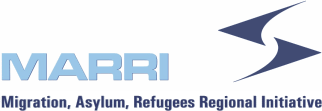In response to the growing demand for a foreign workforce in the Western Balkans and recent legal reforms facilitating the employment of foreigners, the Regional Conference titled “Protection and Economic Prospects: Fostering Labour Participation of Asylum Seekers in the Western Balkans” was held on 25 September in Skopje. Organized by the MARRI Regional Centre in collaboration with GIZ North Macedonia, the event aimed to shed light on the challenges and opportunities faced by asylum seekers already in the region.
The conference brought together key stakeholders and experts from both the Western Balkans and EU member states to discuss the potential benefits and challenges in improving asylum seekers’ access to the labour market, with a particular focus on Bosnia and Herzegovina and Serbia. The participants examined the current state of the labour market, the need for further legal reforms, and shared best practices from the EU and the region to enhance labour market integration efforts.
The event opened with remarks from Fatmir Sabriu, State Secretary, Ministry of Social Policy, Demography, and Youth, Republic of North Macedonia; Snezana Trajanovska, MSc, MARRI RC Director; Kevin Maass, Second Secretary, Political Department, Embassy of Germany in North Macedonia; and David Oberhuber, GIZ Country Director.
In her welcome address, Director Trajanovska emphasized the significance of the conference as a platform for initiating discussions on the economic potential and challenges of integrating asylum seekers into the labour market. She noted that enhancing access to formal employment would not only benefit asylum seekers but also contribute to the region’s economic growth, address labour shortages, and strengthen social systems. She also underscored the need to ensure that labour market access is inclusive of all individuals, regardless of gender, by addressing gender-specific barriers and promoting equal opportunities.
The foundation for the discussions at the conference was the analysis titled “Economic Aspects and Opportunities in Hosting People on the Move in Bosnia and Herzegovina and Serbia.” This analysis was conducted and presented by a team of experts, including Dr. Isabel Ruiz, GIZ Expert/Professor, University of Oxford; Dr. Ivana Krstic, GIZ Expert/Professor, University of Belgrade; and Dr. Nermin Oruc, GIZ Expert/Researcher, Centre for Development Evaluation and Social Science Research, Bosnia and Hercegovina.
In addition to the two panel sessions—featuring experts and representatives from MARRI administrations, academia, international organizations, and civil society who exchanged views on the topic—the conference Agenda also included a segment dedicated to the transfer of knowledge from EU best practices. These were presented by Geert Daems from the Federal Agency for the Reception of Asylum Seekers (Fedasil) in Belgium.
All thematic sessions of the conference were moderated by Dr. Guido Tintori, Economic Affairs Officer at the Organization for Security and Co-operation in Europe (OSCE) Secretariat.
The conference is part of the project “Fostering Economic Opportunities of MARRI Participants by Enhancing the International Protection System,” a component of a broader GIZ initiative on the social participation of migrants and host populations in the Western Balkans. This project is commissioned by the Federal Ministry for Economic Cooperation and Development (BMZ) under its Special Initiative on Forced Displacement. Through this project, MARRI aims to strengthen the capacities of government institutions and improve the conditions for the social and labour participation of asylum seekers in the six MARRI Participants.

